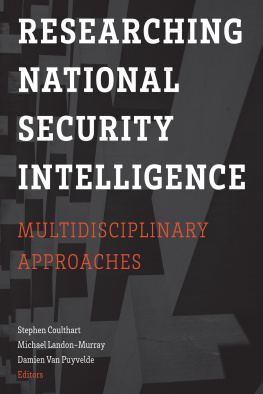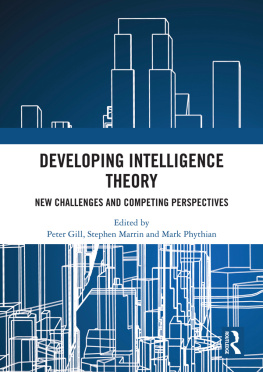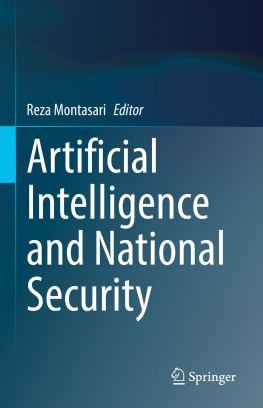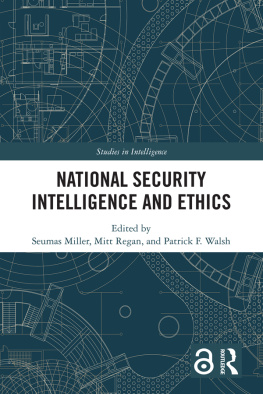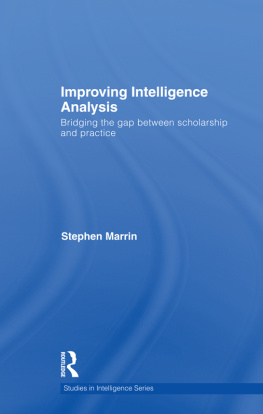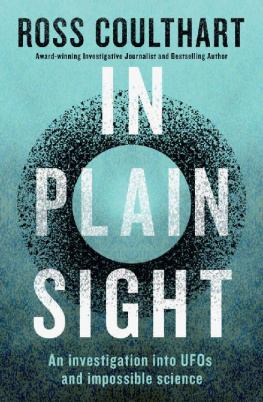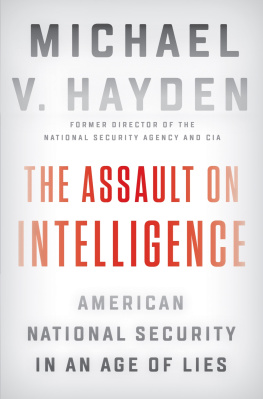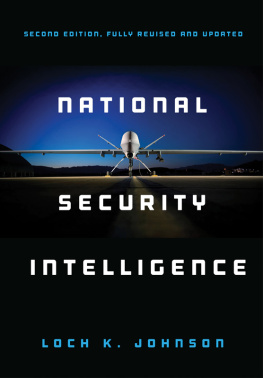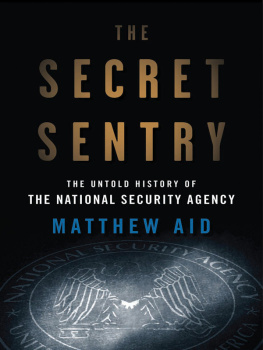RESEARCHING NATIONAL SECURITY INTELLIGENCE
Related Works from Georgetown University Press
Analyzing Intelligence: National Security Practitioners Perspectives, Second Edition
Roger Z. George and James B. Bruce, Editors
Intelligence Elsewhere: Spies and Espionage outside the Anglosphere
Philip H. J. Davies and Kristian Gustafson, Editors
Principled Spying: The Ethics of Secret Intelligence
David Omand and Mark Phythian
Spy Chiefs, Volume I: Intelligence Leaders in the United States and United Kingdom
Christopher Moran, Mark Stout, Ioanna Iordanou, and Paul Maddrell, Editors
Spy Chiefs, Volume II: Intelligence Leaders in Europe, the Middle East, and Asia
Paul Maddrell, Christopher Moran, Ioanna Iordanou, and Mark Stout, Editors
To Catch a Spy: The Art of Counterintelligence
James M. Olson
RESEARCHING NATIONAL SECURITY INTELLIGENCE
MULTIDISCIPLINARY APPROACHES
Stephen Coulthart
Michael Landon-Murray
Damien Van Puyvelde
EDITORS
2019 Georgetown University Press. All rights reserved. No part of this book may be reproduced or utilized in any form or by any means, electronic or mechanical, including photocopying and recording, or by any information storage and retrieval system, without permission in writing from the publisher.
The publisher is not responsible for third-party websites or their content. URL links were active at time of publication.
Library of Congress Cataloging-in-Publication Data
Names: Coulthart, Stephen, editor. | Landon-Murray, Michael, editor. | Van Puyvelde, Damien, editor.
Title: Researching National Security Intelligence : Multidisciplinary Approaches / Stephen Coulthart, Michael Landon-Murray, and Damien Van Puyvelde, editors.
Description: Washington, DC : Georgetown University Press, 2019. | The idea for Researching National Security Intelligence can be traced to a colloquium held at the University of Texas at El Paso (UTEP) in March 2017 and funded by the Intelligence Community Center for Academic Excellence programPreface. | Includes bibliographical references and index. |
Identifiers: LCCN 2019003693 (print) | LCCN 2019016341 (ebook) | ISBN 9781626167056 (ebook) | ISBN 9781626167032 | ISBN (hardcover : alk. paper) | ISBN 9781626167049 (pbk.: alk. paper)
Subjects: LCSH: National securityResearchCongresses. | Military intelligenceResearchCongresses. | Intelligence serviceResearchCongresses. | National securityStudy and teachingCongresses. | Military intelligenceStudy and teachingCongresses. | Intelligence serviceStudy and teachingCongresses.
Classification: LCC UA10.5 (ebook) | LCC UA10.5 .R469 2019 (print) | DDC 327.12dc23
LC record available at https://lccn.loc.gov/2019003693

This book is printed on acid-free paper meeting the requirements of the American National Standard for Permanence in Paper for Printed Library Materials.
20 19 9 8 7 6 5 4 3 2 First printing
Printed in the United States of America.
Cover design by Martyn Schmoll.
In memory of Sean Curtis (19922018)
Contents
Stephen Coulthart, Michael Landon-Murray, and Damien Van Puyvelde
Mark Phythian
John Ferris
Damien Van Puyvelde
Misty Duke
Bridget Rose Nolan
Stephen Marrin
David R. Mandel
Rick Caceres-Rodriguez and Michael Landon-Murray
Rubn Arcos
Brent Durbin
Paul Lashmar
Ross Bellaby
Stephen Coulthart, Michael Landon-Murray, and Damien Van Puyvelde
Illustrations
Preface
The idea for Researching National Security Intelligence can be traced to a colloquium held at the University of Texas at El Paso (UTEP) in March 2017 and funded by Intelligence Community Centers for Academic Excellence. At the event practitioners and scholars from five countries presented papers on navigating the realities of intelligence research. During the colloquium we realized the ideas were important enough to warrant a book-length treatment in an edited volume that would share insights with a wider audience and help advance the field.
Our motivation for this volume has been threefold. First, we wanted to create an interdisciplinary text that would provide guidance to fellow and emerging intelligence scholars. This volume also provided an outlet for us to explore some of the methodological and practical issues we have grappled with throughout our (relatively short) academic careers. Thirdand perhaps most ambitiouslywe wanted to create a volume that showcased the highly diverse perspectives of intelligence research. We sought out authors who had a wide array of disciplinary perspectives, ranging from journalism to sociology. We also wanted to capture a broad range of scholar-practitioner perspectives; our contributors have experience working in Canadian, UK, and US national security intelligence agencies. Bringing in diverse disciplinary and scholar-practitioner perspectives has not been without its challenges, requiring us to weave together a coherent narrative while leveraging the uniqueness of each contributors perspective.
The purpose of this volume is thus to assist anyone interested in researching, and ultimately seeking to understand, intelligence and its many associated processes. We have designed it to provide an accessible introduction to the various theoretical perspectives and methods used in a field that has become increasingly dynamic in the last decade. Evolutions in the fieldspecifically the growing number of disciplines involved in intelligence research at universities and beyond and growing student interestcalled for a new book on national security intelligence research. The task was made all the more important because writing about methodology is essential to anchoring this field in academia. Scholars and graduate students will find Researching National Security Intelligence useful for the light it sheds on a field that is in a state of flux. Throughout the volume contributors have identified emerging research themes and approaches to develop original and innovative intelligence research. A secondary, but important, audience is practitioners at intelligence agencies and in government generally. This book will provide them insights into the minds and multifaceted work of intelligence scholars.
This project was made possible thanks to the support of various colleagues, mentors, and friends. We are indebted to Larry Valero and to the staff and students of UTEPs National Security Studies Institute (NSSI). All three of us have worked or currently work in this unit and are deeply appreciative of Larrys tireless efforts to develop intelligence education and scholarship. This volume is a testament to his devotion to fostering interdisciplinary, rigorous intelligence research. We are also thankful to our editor, Don Jacobs, and two anonymous reviewers who helped us refine our ideas. Stephen would like to thank his doctoral advisers and good friends William N. Dunn and Michael Kenney at the University of Pittsburghs Graduate School of Public and International Affairs. Over the years both have provided a sounding board for many ideas that came to fruition in this book. Michael would like to express his heartfelt thanks to Sydney Cresswell, whose support, guidance, and friendship over many years were essential and deeply rewarding (and continue to be!). Likewise, Michael would like to say how fortunate he has been to have the instrumental mentorship and motivation provided by Victor Asal and Jim Steiner. Damien thanks Peter Jackson, R. Gerald Hughes, Len Scott, and the late Chikara Hashimoto for challenging him to think about methodology and intelligence research. We will close by stating our thanks to the volumes contributors. When we began this project, colleagues warned us that coordinating among the various contributions and authors would be time-consuming. Ultimately, though, working with the authors has been one of the easiestand most rewardingparts of the job.

 This book is printed on acid-free paper meeting the requirements of the American National Standard for Permanence in Paper for Printed Library Materials.
This book is printed on acid-free paper meeting the requirements of the American National Standard for Permanence in Paper for Printed Library Materials.
